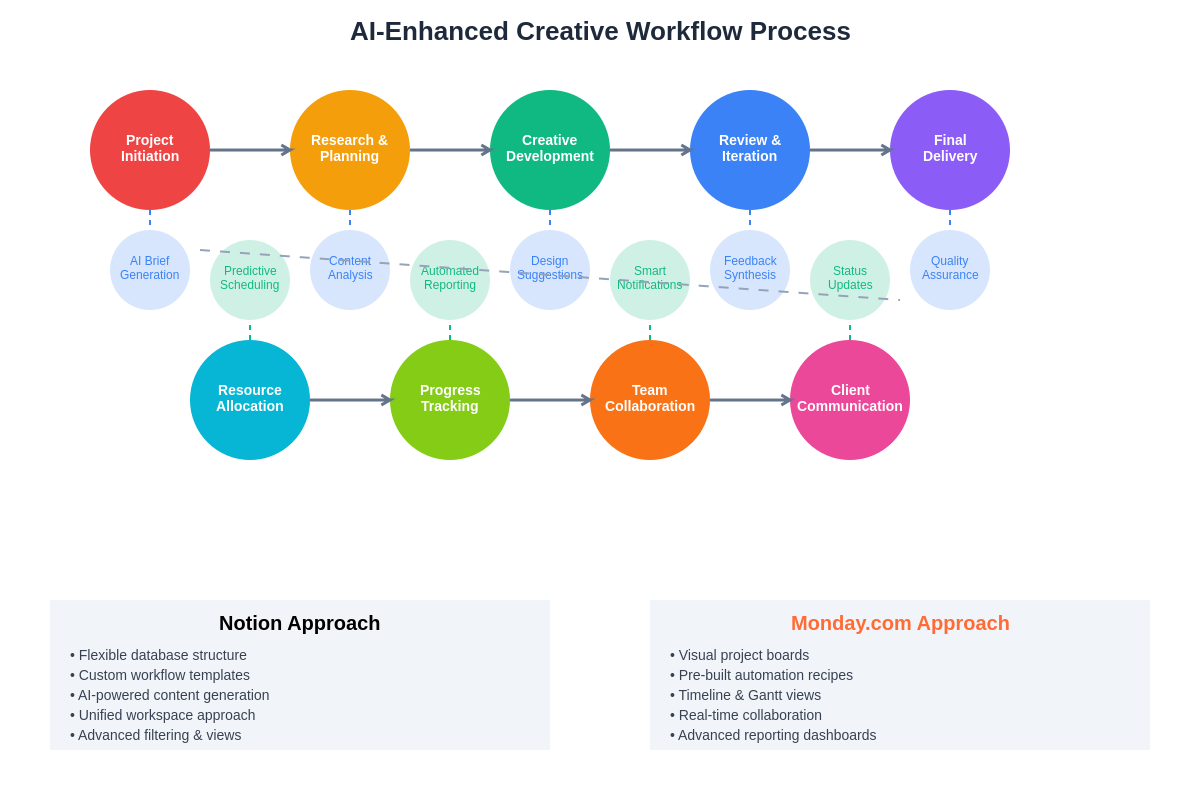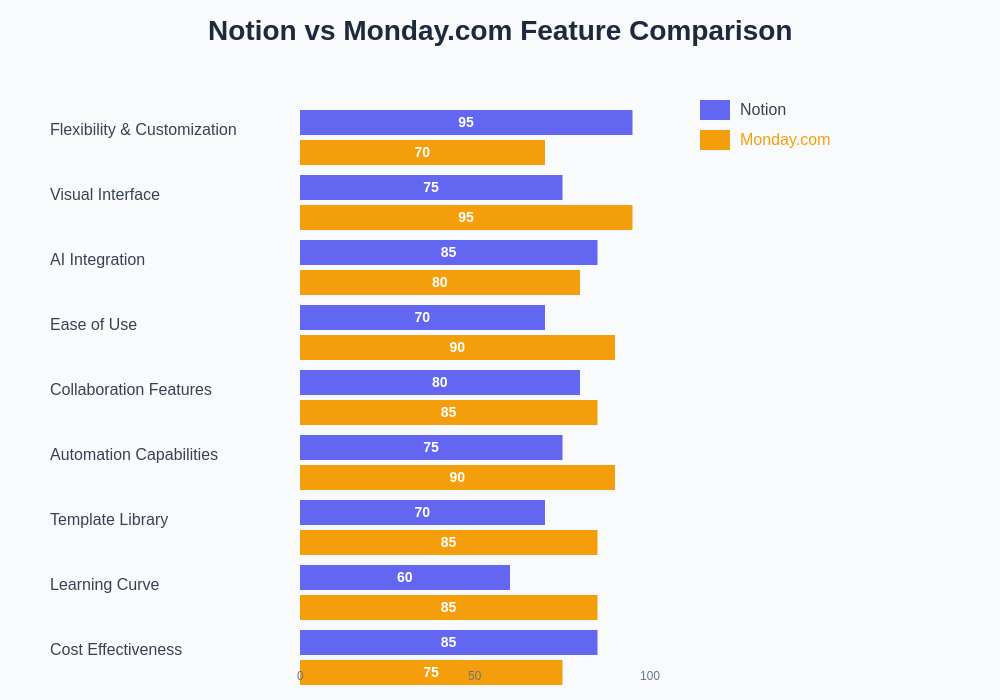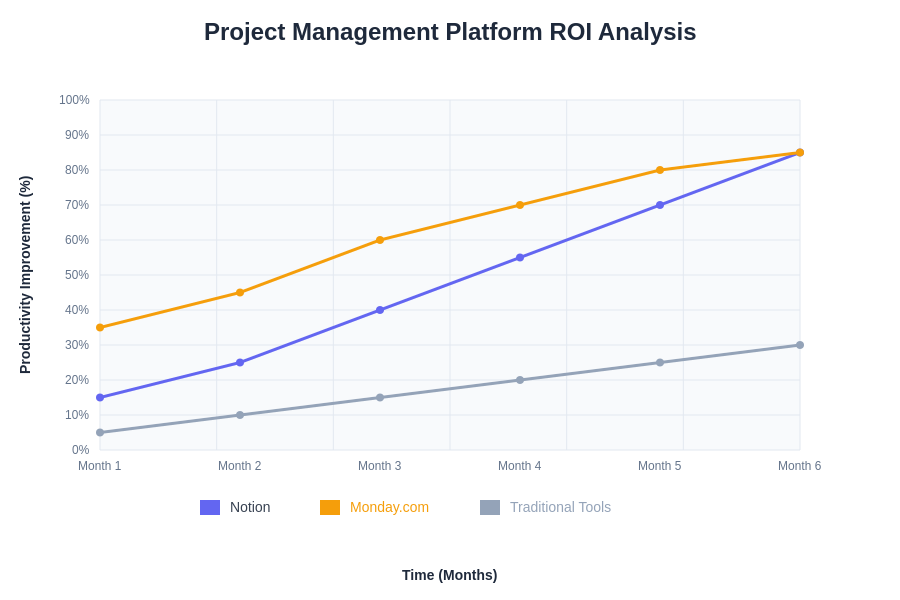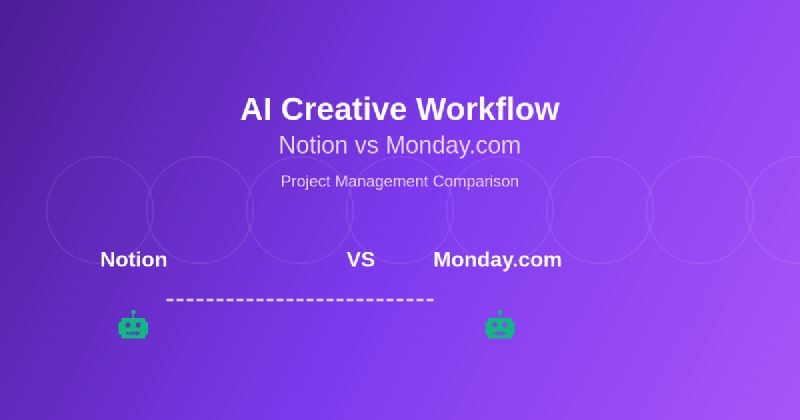The evolution of creative project management has reached a pivotal moment where artificial intelligence converges with sophisticated workflow platforms to revolutionize how creative teams conceptualize, execute, and deliver their projects. In this comprehensive analysis, we examine two leading contenders in the project management arena: Notion and Monday.com, specifically through the lens of AI-enhanced creative workflows. Both platforms have emerged as powerful solutions for managing complex creative projects, yet they approach the integration of artificial intelligence and creative workflow management through distinctly different philosophies and methodologies.
Explore the latest AI productivity trends to understand how cutting-edge technologies are reshaping creative project management and team collaboration in unprecedented ways. The landscape of creative work has fundamentally transformed as AI capabilities become more sophisticated and accessible, requiring project management platforms to adapt and evolve beyond traditional task tracking and resource allocation.
The modern creative professional operates in an environment where artificial intelligence serves not merely as a tool but as a collaborative partner in the creative process. From generating initial concepts and mood boards to optimizing resource allocation and predicting project timelines, AI has become integral to every aspect of creative workflow management. This transformation demands project management platforms that can seamlessly integrate these AI capabilities while maintaining the flexibility and intuitive design that creative teams require for their dynamic and often unpredictable workflows.
Understanding AI-Enhanced Creative Workflows
The integration of artificial intelligence into creative workflows represents a fundamental shift in how creative projects are conceived, planned, executed, and delivered. Traditional project management focused primarily on task coordination, deadline tracking, and resource allocation, but AI-enhanced workflows introduce predictive analytics, automated content generation, intelligent resource optimization, and adaptive project planning that responds dynamically to changing creative requirements and constraints.
Creative teams utilizing AI-enhanced workflows benefit from intelligent task prioritization that considers both creative dependencies and resource availability, automated progress tracking that accounts for the iterative nature of creative work, and predictive analytics that help anticipate potential bottlenecks or resource conflicts before they impact project delivery. These capabilities transform project management from a reactive discipline focused on tracking and reporting to a proactive system that anticipates needs and optimizes outcomes.

The comprehensive workflow diagram illustrates how artificial intelligence integrates seamlessly into every stage of creative project management, from initial concept development through final delivery, while providing continuous optimization of resource allocation and team collaboration throughout the entire project lifecycle.
The sophistication of modern AI integration extends beyond simple automation to include contextual understanding of creative processes, intelligent suggestion systems that enhance creative decision-making, and adaptive learning algorithms that improve workflow efficiency based on team behavior and project patterns. This level of integration requires project management platforms that can accommodate the unique requirements of creative work while providing the robust AI capabilities that modern teams demand.
Notion: The All-in-One Creative Workspace
Notion has established itself as a versatile platform that combines database functionality, document creation, and project management within a unified workspace designed to adapt to diverse creative workflows. The platform’s strength lies in its exceptional flexibility and customization capabilities, allowing creative teams to construct workflows that precisely match their unique processes and requirements without being constrained by rigid templates or predetermined structures.
Experience advanced AI capabilities with Claude to enhance your creative workflow management through intelligent content generation, automated documentation, and sophisticated project planning assistance. The integration of AI tools with Notion’s flexible architecture creates powerful synergies that amplify creative productivity and streamline complex project coordination.
The platform’s approach to AI integration focuses on enhancing existing workflows rather than imposing new structures, allowing teams to incorporate AI-generated content, automated task creation, and intelligent data analysis into their established creative processes. Notion’s AI assistant can generate creative briefs, summarize project status reports, create detailed project timelines, and even suggest creative directions based on project parameters and historical data.
Notion’s database functionality provides creative teams with sophisticated tools for managing assets, tracking project iterations, organizing research materials, and maintaining comprehensive project documentation. The platform’s ability to create custom properties, establish complex relationships between different data types, and generate dynamic views makes it particularly suitable for creative projects that involve multiple stakeholders, varied deliverables, and complex approval processes.
The collaborative features within Notion enable real-time editing, comprehensive commenting systems, and granular permission controls that ensure creative teams can work together efficiently while maintaining appropriate oversight and version control. The platform’s integration capabilities allow teams to connect with essential creative tools, import data from external sources, and maintain synchronized workflows across multiple applications and platforms.
Monday.com: Visual Project Management Excellence
Monday.com approaches creative project management through a visual-first philosophy that emphasizes intuitive interfaces, clear progress visualization, and streamlined team communication. The platform’s strength lies in its ability to present complex project information in visually appealing and easily digestible formats that help creative teams quickly understand project status, resource allocation, and upcoming deadlines without requiring extensive navigation or complex queries.
The platform’s AI capabilities focus on workflow automation, intelligent resource allocation, and predictive project analytics that help creative teams optimize their processes and deliver projects more efficiently. Monday.com’s AI can automatically assign tasks based on team member expertise and availability, predict project completion dates based on historical data and current progress, and identify potential bottlenecks that could impact creative deliverables.
Monday.com’s template library includes specialized workflows designed specifically for creative teams, including advertising campaigns, content creation pipelines, design projects, and video production workflows. These templates incorporate industry best practices and can be customized to match specific team requirements while maintaining the platform’s visual clarity and ease of use.
The platform’s automation capabilities allow creative teams to eliminate repetitive tasks, ensure consistent communication protocols, and maintain standardized approval processes across different projects and clients. These automations can be triggered by various project events, status changes, or timeline milestones, ensuring that team members are always informed about relevant project developments and upcoming responsibilities.
Monday.com’s reporting and analytics features provide creative teams with comprehensive insights into project performance, resource utilization, and team productivity. The platform can generate detailed reports on project profitability, timeline adherence, and resource efficiency, helping creative managers make data-driven decisions about project planning and resource allocation.
Feature Comparison and Analysis
When comparing Notion and Monday.com for AI-enhanced creative workflows, several key differentiators emerge that can significantly impact team productivity and project success. Notion excels in flexibility and customization, allowing creative teams to build precisely the workflows they need without being constrained by predetermined structures or templates. This flexibility comes with the trade-off of requiring more initial setup time and ongoing maintenance to ensure optimal performance.
Monday.com prioritizes visual clarity and ease of use, providing creative teams with intuitive interfaces that require minimal training and deliver immediate value. The platform’s visual approach to project management makes it particularly effective for teams that need to quickly communicate project status to clients, stakeholders, or executives who may not be familiar with detailed project management terminology or concepts.
Discover comprehensive AI research capabilities with Perplexity to enhance your project planning and competitive analysis processes through intelligent information gathering and synthesis. The ability to quickly research creative trends, competitor activities, and market opportunities becomes crucial for maintaining competitive advantage in rapidly evolving creative industries.
The AI integration approaches differ significantly between the platforms, with Notion focusing on content generation and workflow enhancement within its flexible framework, while Monday.com emphasizes automation, visualization, and predictive analytics within its structured environment. These different approaches serve different team preferences and project requirements, with some teams preferring Notion’s adaptability while others benefit from Monday.com’s guided structure.

The comprehensive feature analysis reveals distinct strengths in each platform’s approach to AI-enhanced creative project management. While Notion excels in flexibility and customization capabilities, Monday.com demonstrates superior visual interface design and ease of implementation, creating complementary value propositions for different types of creative teams and project requirements.
Integration capabilities vary between the platforms, with both offering extensive third-party connections but through different approaches. Notion’s integration philosophy focuses on embedding external content and data within its unified workspace, while Monday.com emphasizes bidirectional synchronization and workflow automation across multiple platforms and tools.
Workflow Optimization Strategies
Successful implementation of AI-enhanced creative workflows requires careful consideration of team dynamics, project requirements, and organizational goals. Teams utilizing Notion benefit from investing time in initial setup and customization to create workflows that precisely match their creative processes, while Monday.com users can achieve rapid deployment through template customization and iterative refinement.
The optimization of AI features within creative workflows requires ongoing attention to data quality, workflow refinement, and team training. Both platforms benefit from regular review and adjustment of AI settings, automation rules, and workflow structures to ensure continued alignment with evolving team needs and project requirements.
Creative teams should consider implementing hybrid approaches that leverage the strengths of both platforms, using Notion for detailed project planning and documentation while utilizing Monday.com for client communication and high-level project visualization. This approach requires careful integration planning but can deliver superior results for teams that need both flexibility and visual clarity.
Integration Ecosystem and Compatibility
The modern creative workflow depends heavily on seamless integration between multiple tools and platforms, making integration capabilities a crucial consideration when selecting project management solutions. Notion’s integration approach emphasizes embedding external content and maintaining comprehensive project documentation within a single workspace, making it ideal for teams that prefer centralized information management and minimal context switching.
Monday.com’s integration strategy focuses on automation and workflow synchronization across multiple platforms, enabling creative teams to maintain their preferred tool stack while ensuring consistent data flow and communication protocols. The platform’s automation capabilities can trigger actions across integrated tools, creating sophisticated workflows that span multiple applications and platforms.
Both platforms offer robust API capabilities that enable custom integrations and workflow automation, though the implementation approaches differ significantly. Notion’s API focuses on content management and database operations, while Monday.com’s API emphasizes workflow automation and real-time synchronization. These different approaches serve different technical requirements and integration strategies.
The consideration of future integration needs becomes particularly important for growing creative teams that may need to add new tools or modify existing workflows as their requirements evolve. Both platforms provide scalable integration architectures, though the specific capabilities and limitations vary based on the chosen approach and implementation strategy.
Cost Analysis and Value Proposition
The financial considerations for implementing AI-enhanced creative project management extend beyond simple subscription costs to include training time, customization effort, and ongoing maintenance requirements. Notion’s flexible pricing structure accommodates teams of various sizes while providing access to advanced AI features at competitive rates, making it attractive for smaller creative teams and independent professionals.
Monday.com’s pricing tiers reflect its focus on team collaboration and advanced project management features, with higher costs for teams that require sophisticated automation and reporting capabilities. The platform’s value proposition centers on reduced setup time and immediate productivity gains, which can justify higher costs for teams that prioritize quick deployment and minimal learning curves.
The total cost of ownership calculation should include training time, customization effort, integration development, and ongoing maintenance requirements. Notion typically requires higher initial investment in setup and training but offers greater long-term flexibility and cost efficiency for teams with evolving requirements. Monday.com provides faster initial deployment but may require higher ongoing costs for advanced features and integrations.

The return on investment analysis demonstrates how different platforms deliver value over time, with Monday.com providing faster initial returns through rapid deployment and intuitive interfaces, while Notion delivers sustained long-term value through increased customization and workflow optimization as teams mature in their project management sophistication.
Security and Compliance Considerations
Creative projects often involve sensitive client information, proprietary designs, and confidential strategic materials that require robust security measures and compliance capabilities. Both Notion and Monday.com provide enterprise-grade security features, but their approaches and capabilities differ in ways that may impact team selection decisions.
Notion’s security architecture focuses on data encryption, access controls, and audit logging within its unified workspace environment. The platform provides granular permission controls that allow creative teams to restrict access to sensitive information while maintaining collaborative workflows. Advanced security features include single sign-on integration, two-factor authentication, and comprehensive audit trails.
Monday.com emphasizes security through its visual interface design and automated workflow controls, providing clear visibility into data access and project permissions. The platform’s security features include role-based access controls, data encryption, and compliance certifications that meet industry standards for creative agencies and enterprise creative teams.
The compliance requirements for creative teams vary significantly based on industry, client requirements, and geographic location. Both platforms provide compliance documentation and certifications, though the specific capabilities and regional coverage may influence selection decisions for teams with strict compliance requirements.
Performance and Scalability Assessment
The performance characteristics of project management platforms become increasingly important as creative teams grow and project complexity increases. Notion’s performance is optimized for flexible data manipulation and content creation, providing excellent responsiveness for teams that frequently modify workflow structures and project templates.
Monday.com’s performance optimization focuses on visual rendering and real-time collaboration, ensuring smooth user experiences even with large datasets and complex project hierarchies. The platform’s visual-first approach requires sophisticated optimization to maintain responsiveness while providing rich graphical interfaces and real-time updates.
Scalability considerations encompass not only technical performance but also organizational factors such as user adoption, workflow standardization, and administrative overhead. Notion’s flexibility can support diverse team growth patterns but may require ongoing management to prevent workflow fragmentation. Monday.com’s structured approach facilitates standardization but may limit adaptability as team requirements evolve.
Future Development and Innovation Trajectory
The rapidly evolving landscape of AI technology and creative tools requires project management platforms to continuously innovate and adapt to emerging requirements. Both Notion and Monday.com have demonstrated commitment to AI integration and feature development, though their innovation trajectories reflect their different philosophical approaches.
Notion’s development focus emphasizes expanding AI capabilities within its flexible framework, enabling more sophisticated content generation, workflow automation, and intelligent data analysis. The platform’s commitment to maintaining flexibility while incorporating advanced AI features positions it well for teams that need adaptable solutions for evolving creative requirements.
Monday.com’s innovation strategy centers on enhancing visual interfaces, expanding automation capabilities, and integrating advanced analytics that provide deeper insights into creative project performance. The platform’s focus on user experience optimization and workflow standardization supports teams that prioritize consistency and efficiency over maximum flexibility.
The consideration of future requirements becomes particularly important for creative teams that anticipate significant growth or evolving project complexity. Both platforms provide roadmaps and development commitments that can guide selection decisions, though the specific features and timelines may vary based on platform priorities and market demands.
Implementation Best Practices and Recommendations
Successful implementation of AI-enhanced creative project management requires careful planning, stakeholder engagement, and iterative refinement based on team feedback and performance metrics. Teams considering Notion should invest time in understanding the platform’s capabilities and designing workflows that leverage its flexibility while maintaining usability for all team members.
Monday.com implementation benefits from leveraging existing templates and gradually customizing workflows based on team feedback and project requirements. The platform’s visual approach facilitates user adoption but requires attention to information architecture to prevent interface clutter and maintain clarity as project complexity increases.
Both platforms benefit from phased implementation approaches that begin with core project management functions and gradually incorporate advanced AI features and workflow automation. This approach allows teams to develop famiciency with platform capabilities while minimizing disruption to ongoing creative projects.
The training and change management aspects of implementation require ongoing attention and resource allocation. Both platforms provide extensive documentation, training resources, and community support, though the specific approaches and effectiveness vary based on team preferences and learning styles.
Conclusion and Strategic Recommendations
The selection between Notion and Monday.com for AI-enhanced creative project management ultimately depends on team priorities, project requirements, and organizational preferences. Notion excels for teams that value flexibility, customization, and unified workspace approaches, while Monday.com provides superior visual interfaces, guided workflows, and rapid deployment capabilities.
Creative teams should carefully evaluate their specific requirements, including project complexity, team size, integration needs, and growth projections when making platform selection decisions. Both platforms offer compelling advantages and can significantly enhance creative workflow management through intelligent AI integration and sophisticated project coordination capabilities.
The future of creative project management lies in the intelligent integration of AI capabilities with flexible workflow platforms that can adapt to evolving creative requirements while maintaining the collaborative features and visual clarity that creative teams require for successful project delivery.
Disclaimer
This article is for informational purposes only and does not constitute professional advice. The views expressed are based on current understanding of project management platforms and their AI capabilities. Readers should conduct their own research and consider their specific requirements when selecting project management tools. Platform features, pricing, and capabilities may change over time and vary by region or subscription tier.
